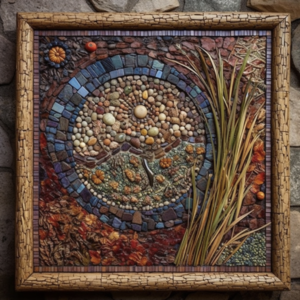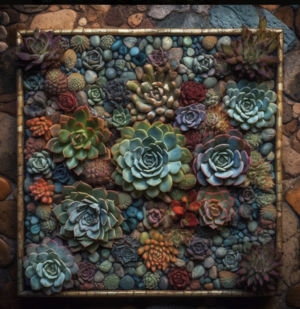Kayse (prime)/Aelotoi Art: Difference between revisions
MERCEDES419 (talk | contribs) |
MERCEDES419 (talk | contribs) |
||
| Line 22: | Line 22: | ||
[[File:Succulents.png|300px|thumb|right|Created by Kayse's player on MidJourney.]] |
[[File:Succulents.png|300px|thumb|right|Created by Kayse's player on MidJourney.]] |
||
Among the Vaer’sah Clan, mosaics were also used as markers or code to help direct other Aelotoi. Scouting parties used directional markers to help each other find resources as well as what way their slave encampment was located. Arriving back late resulted in severe punishment from the [[kiramon]], regardless of whether the Aelotoi returned with an abundance of supplies. Encoded mosaics were also left in the wild by some escaped Aelotoi, secretly directing others to their location for safety. |
Among the Vaer’sah Clan, mosaics were also used as markers or code to help direct other Aelotoi. Scouting parties used directional markers to help each other find resources as well as what way their slave encampment was located. Arriving back late resulted in severe punishment from the [[kiramon]], regardless of whether the Aelotoi returned with an abundance of supplies. Encoded mosaics were also left in the wild by some escaped Aelotoi, secretly directing others to their location for safety. |
||
With the independence to now keep flora and plants in their possession, Aelotoi on Elanthia have used mosaics to celebrate this. Vibrant murals of succulents, fresh flowers, and moss are now the most popular mosaic textiles whether this is in a garden or a hanging box to display these living masterpieces. Of all the different types of art, the use of plants depicts the true essence of blooming and growing into a new life for the Aelotoi. |
With the independence to now keep flora and plants in their possession, Aelotoi on Elanthia have used mosaics to celebrate this. Vibrant murals of succulents, fresh flowers, and moss are now the most popular mosaic textiles whether this is in a garden or a hanging box to display these living masterpieces. Of all the different types of art, the use of plants depicts the true essence of blooming and growing into a new life for the Aelotoi. |
||
Revision as of 17:04, 9 April 2023
Title: Aelotoi Art
Author: Kayse Thaellian
"document" is not in the list (essay, letter, periodical, poetry, short story, song, storyline, vignette) of allowed values for the "Creative-work-type" property.
Foreward
Despite living thousands of years as slaves, the Aelotoi people still found a way to create an artistic culture and embrace a creative outlet amongst themselves. With resources and supplies limited, most of their art served a dual purpose of utility and expression. They named their art, Keh’suta’ka, loosely translated to beautiful imagination. The idea behind Keh’suta’ka is the concept that art can be anything and found anywhere.
On Bre’Naere the pieces from that era are described as crude and primitive, as materials were scarce. Tools to paint, carve or weave were also makeshift and contributed to artwork taking longer to make or not as refined. Within their twenty years now on Elanthia, Aelotoi art has evolved, yet still possesses the same techniques that were established in their home world. Due to these two distinct periods of time that influenced Aelotoi culture and art, the race now uses two terms to describe the different art periods: Keh’dyre and Keh’cyr. Keh’dyre being “art of darkness” from their time on Bre’naere and Keh’dyre meaning “art of light” to describe how their artistry has transitioned.
The Aelotoi strongly embrace art as an expression of their freedom. It is my hope within this document to provide a lens into the materials, process, and evolution of Aelotoi art.
~Kayse Thaellian, Vaer’sah Clan
Mosaics
Mosaics that existed in a mobile form were considered rare on Bre’Naere. Elaborate designs or labyrinths were created on the ground to admire, but could quickly be destroyed if the overseers arrived. The materials to design a mosaic pull strongly from the concept of Keh’suta’ka considering most items are found within nature. Multi-hued pigments, seeds, grains, and scraps of fabric were utilized to add shading, texture, and color to this artform.
If something truly unique was found in nature, like a piece of sea glass or unique stone, those objects were saved for a permanent mosaic. When coveted paper or even a canvas of goat skin could be created, the Aelotoi would work by firelight to construct mosaics using a hide-based animal adhesive from paeline goats. These artifacts were still rather small so they could be easily concealed, but it is rather uncommon that many made it to Elanthia.
Among the Vaer’sah Clan, mosaics were also used as markers or code to help direct other Aelotoi. Scouting parties used directional markers to help each other find resources as well as what way their slave encampment was located. Arriving back late resulted in severe punishment from the kiramon, regardless of whether the Aelotoi returned with an abundance of supplies. Encoded mosaics were also left in the wild by some escaped Aelotoi, secretly directing others to their location for safety.
With the independence to now keep flora and plants in their possession, Aelotoi on Elanthia have used mosaics to celebrate this. Vibrant murals of succulents, fresh flowers, and moss are now the most popular mosaic textiles whether this is in a garden or a hanging box to display these living masterpieces. Of all the different types of art, the use of plants depicts the true essence of blooming and growing into a new life for the Aelotoi.
Although some Aelotoi are still resistant to wear or even include gems in their art, those of the Vaer’sah clan also use gemstones as their preferred medium.

